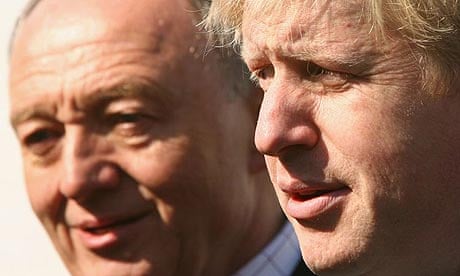Ken Livingstone, the former mayor of London, has accused his successor, Boris Johnson, of trying to "pay off" the former editor of the Evening Standard with a top arts job in the capital in return for its coverage in last year's mayoral election.
This week it emerged that the culture secretary, Ben Bradshaw, had vetoed Johnson's recommendation to install Veronica Wadley as Arts Council for London chair. But the mayor has refused to recommend another candidate for approval, signalling that he is prepared to leave the post open until after the general election, when he hopes a Conservative government would allow Wadley's appointment.
The Standard under her stewardship was seen as playing an instrumental role in Johnson's successful campaign last year, running a number of articles in the run-up to the poll that suggested Livingstone's mayoralty was riddled with cronyism.
"This is quite simply a payoff for the scale of support they provided for Boris in the election," said Livingstone.
"She has no background in the arts. There are lots of Conservatives in London who have."
Livingstone added that Johnson should have the right to appoint the role but he should pick somebody who fulfilled the criteria. "Many of the people I appointed were criticised for being on the left, but never for not being able to do the job."
Bradshaw turned down Johnson's choice because he was advised the appointment process was in "clear contravention" of the Nolan principles that govern public appointments.
A furious Johnson described the decision as "politically motivated" and said he would keep the seat vacant until "another" person was in the culture secretary post.
His office said that the mayor was "considering options".
In a letter to Johnson, Len Duvall, the leader of the Labour group in the London assembly, asked the mayor to detail the rationale for recommending Wadley, the editor "who supported your campaign unswervingly", and to highlight her qualifications for the job, "aside from editing the Evening Standard and chairing the newspaper's own theatre awards panel".
"As an act of good faith, and to show that you are not motivated in this matter either by nepotism or political spite, please also undertake to recommend an appointment to the chair before the next general election," he wrote.
Duvall seized on a leaked letter written by Liz Forgan, who is the Arts Council England chair (Forgan is also chair of the Scott Trust, the owner of the Guardian) to the culture department in which she said that Johnson did not follow the process and opted for a candidate "manifestly less qualified" than three other distinguished candidates on the shortlist.
Johnson said he had opted for Wadley because she had given a "good interview", she agreed with his policy on music in schools, and she had some good ideas on private fundraising, while Wadley issued a statement defending her record as an editor, during which time, she said, she had engaged with "all areas of the arts".
